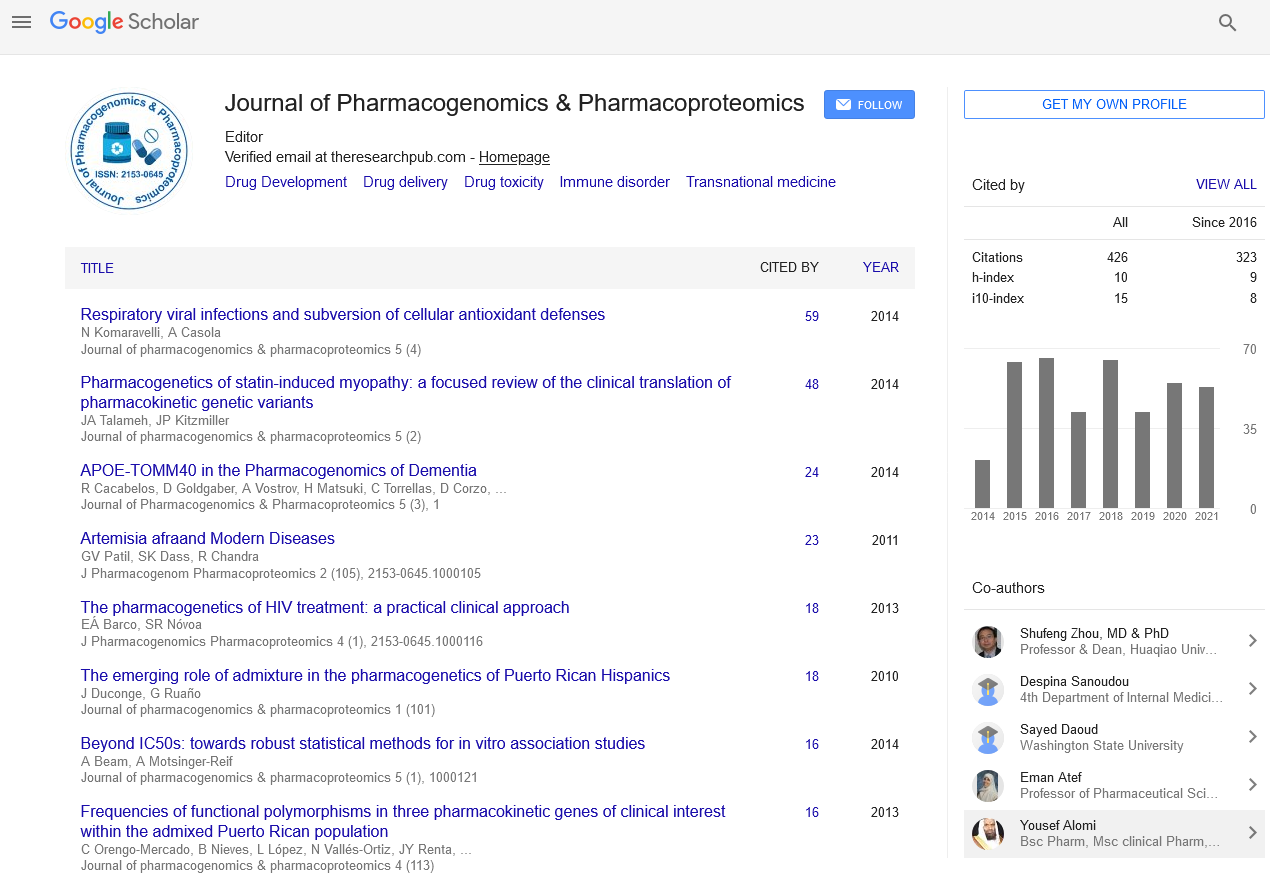Indexed In
- Open J Gate
- Genamics JournalSeek
- Academic Keys
- JournalTOCs
- ResearchBible
- Electronic Journals Library
- RefSeek
- Hamdard University
- EBSCO A-Z
- OCLC- WorldCat
- Proquest Summons
- SWB online catalog
- Virtual Library of Biology (vifabio)
- Publons
- MIAR
- Euro Pub
- Google Scholar
Useful Links
Share This Page
Journal Flyer

Open Access Journals
- Agri and Aquaculture
- Biochemistry
- Bioinformatics & Systems Biology
- Business & Management
- Chemistry
- Clinical Sciences
- Engineering
- Food & Nutrition
- General Science
- Genetics & Molecular Biology
- Immunology & Microbiology
- Medical Sciences
- Neuroscience & Psychology
- Nursing & Health Care
- Pharmaceutical Sciences
A genomic approach to histamine function
5th International Conference on Predictive, Preventive and Personalized Medicine & Molecular Diagnostics
December 01-02, 2016 Valencia, Spain
Juan C Carril, Lucia Fernandez-Novoa, Lola Corzo, Silvia Seoane, Ivan Carrera, Oscar Teijido and Ramon Cacabelos
EuroEspes Biotechnology, Spain
EuroEspes Biomedical Research Center, Spain
Posters & Accepted Abstracts: J Pharmacogenomics Pharmacoproteomics
Abstract:
Histamine is an ancestral biogenic amine present in many living tissues as a normal constituent of the body with multiple effects in several organs of mammals and invertebrates. Histamine exerts its effects on target cells through 4 different types of receptors: H1, H2, H3 and H4. Genetic variation in histamine receptors and histamine synthesizing and metabolizing enzymes is associated with differences in histamine metabolism, altered enzyme activities and risk of disease. To advance in the knowledge of histamine genomics, we analyzed 3 genetic polymorphisms in the H1 receptor gene (rs901865), the H2 receptor gene (rs2067474) and the HNMT gene (rs11558538) in 195 patients, to establish a potential association between these polymorphisms and blood histamine levels, serum levels of Igs, PCR-us, TNF and several ILs, as well as blood cells count. The results showed an association with serum TNF levels and monocyte count for the HRH1 gene polymorphism. Subjects with genotype GG have increased serum TNF and monocyte count comparing with subjects with genotype GA+AA. There are more subjects with abnormal serum TNF levels and genotype GG, than with genotype GA+AA. The HRH2 gene polymorphism is associated with pathological PCR-us levels. Subjects with genotype GA presented abnormal values of serum PCR-us comparing to subjects with genotype GG. The HNMT polymorphism showed an association with serum IL8 levels. Individuals with genotype CC have increased levels of IL8 in comparison with individuals with genotype CT. The results of this study indicate that HA-related polymorphisms participate in the modulation of the immuneinflammatory response.
Biography :
Juan C Carril is the Director of the Genomics and Pharmacogenomics Department at EuroEspes Biomedical Research Center, Institute of Medical Science and Genomic Medicine, Corunna, Spain. He has received his PhD from Santiago de Compostela University in 2000 with the thesis entitled Genetic structure and profile of the populations of the Iberian Peninsula by means of markers (STRs and SNPs) of the human Y-chromosome. He has published more than 40 scientific publications in the fields of population genetics, forensic genetics, genetic epidemiology and pharmacogenetics and over 40 papers at national and international conferences.
Email: genomica@euroespes.com


